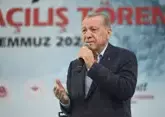The aggravation of the conflict between India and Pakistan, which turned into military clashes on the ground and in the air, caused serious concern of the world community. Moscow and Washington make official statements about extreme concern by the current situation and the need to de-escalate a conflict between the two nuclear powers. Regional players, in particular, China and Turkey, have already declared their willingness to play a role in resolving the current contradictions.
The situation sharply worsened after mid-February's suicide attack in the Indian part of Kashmir and both countries's reaction, expert of the Stiftung Wissenschaft und Politik (SWP) Christian Wagner said in an interview with Dlf. As a result of a suicide bomber, more than 40 military reservists from the Indian side were killed.
"The current danger is that India’s air strike on the alleged terrorist camp in Pakistan has caused a red line shift. India has made it clear that it can attack terrorist groups all over Pakistan. For the first time, Pakistan’s territory outside of Kashmir was attacked," the expert recalls.
Pakistan also made it clear with its air strikes that its reaction can be different. "It was also an innovation," Wagner noted. A positive signal is that the foreign ministries of both countries spoke in favor of de-escalation. "It is to be hoped that the time of military muscle-flexing has passed, and the situation will become stable again," the German expert said.
According to Wagner, it is problematic that militant groups still exist in Pakistan, when in fact they are prohibited. "These groups have taken advantage of local discontent in Kashmir to bring their agenda - the issue of ownership - to the public. Naturally, both sides have opportunities to improve the situation, and until it happens, militant groups will always find new ways to attack, paying attention to their problems," the expert is confident.
Wagner does not see the logic of the fact that Pakistan places the responsibility for escalating the conflict on the U.S: "It could be an attempt to internationalize the conflict, to say that the conflict between the two nuclear powers may escalate, and therefore intervention in the situation should be in the interests of the international community."
Meanwhile, a professor at the Free University of Berlin, expert on Asian countries Hermann Kreutzmann said in an interview with BILD that India’s attack on Pakistan’s militant camp after the attack was expected. "In April, elections will be held in India. This is a good opportunity to demonstrate strength," the professor noted. According to the expert, Indian aviation deliberately flew over the Pakistani part of Kashmir to demonstrate its capabilities. In response, Pakistan shot down an Indian aircraft on February 27. Kreutzmann believes that it is extremely unlikely that the clashes may erupt into a threat to peace, since these are two nuclear powers: "Conflicts between two countries possessing nuclear weapons are usually characterized by the fact that they themselves do not want war, but want to take deterrence measures against the enemy."
On February 28, Pakistani Prime Minister Imran Khan said his country will release the captured Indian pilot as a "peace gesture." A day earlier, Khan turned to India with a proposal to start negotiations on problematic issues. New Delhi responded positively to Islamabad’s willingness to release the pilot. On the issue of negotiations, the Indians are more skeptical, saying that there is no basis for dialogue until Pakistan "does not take stronger action against terror groups operating from its soil."










